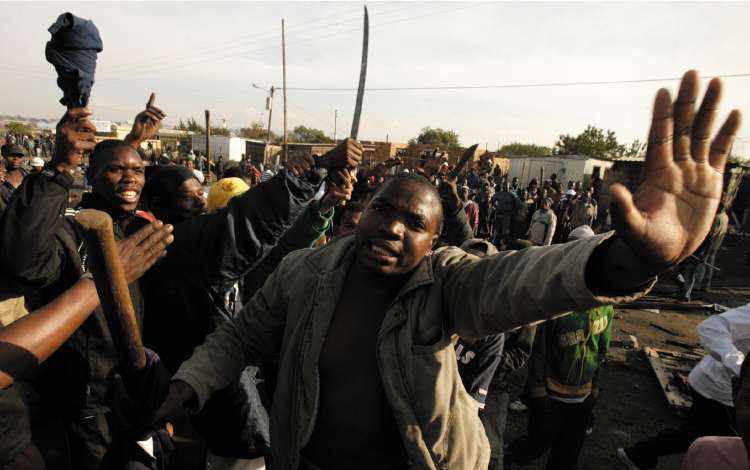Your support helps us to tell the story
From reproductive rights to climate change to Big Tech, The Independent is on the ground when the story is developing. Whether it's investigating the financials of Elon Musk's pro-Trump PAC or producing our latest documentary, 'The A Word', which shines a light on the American women fighting for reproductive rights, we know how important it is to parse out the facts from the messaging.
At such a critical moment in US history, we need reporters on the ground. Your donation allows us to keep sending journalists to speak to both sides of the story.
The Independent is trusted by Americans across the entire political spectrum. And unlike many other quality news outlets, we choose not to lock Americans out of our reporting and analysis with paywalls. We believe quality journalism should be available to everyone, paid for by those who can afford it.
Your support makes all the difference.South Africa has been rocked by a wave of xenophobic violence that has sent thousands of immigrants in Johannesburg fleeing for shelter as mobs beat, stabbed, shot and burnt people alive.
The government was urged to deploy troops in and around the country's financial capital last night as the death toll climbed to 22, with more than 250 people arrested.
In scenes reminiscent of unrest during the apartheid era, gangs of men armed with clubs and jugs of petrol have been targeting Zimbabweans, Mozambicans, Malawians and others who they claim are taking scarce jobs and houses and committing crime.
The country's Human Rights Commission supported by the opposition Democratic Alliance called on the ANC government to mobilise the army in the worst affected areas.
Refugees from Zimbabwe are bearing the brunt of the attacks. There are an estimated 3.5 million Zimbabwean refugees in South Africa out of a national total of five million illegal foreigners.
But many have now been forced to escape their shacks in townships and suburbs such as Alexandra, Diepsloot and Boksburg with only the possessions they could carry and find sanctuary at police stations where they are protected by armed officers.
Around 1,000 have taken refuge at the Central Methodist Church in central Johannesburg, which has long been a safe haven for recent newcomers from Zimbabwe.
Bishop Paul Verryn of the church said: "We consider the situation is getting so serious that the police can no longer control it."
He said thata group of armed people had approached the church on Sunday night, but police intervention had sent them away. "It is so sad. They need security, blankets, food and counselling. But most of all they just need to be treated as human beings." Emmerson Ziso fled hunger and repression in Zimbabwe, but said he plans to return. "Most of the Zimbabweans want to leave. It is better at home than here," said the former teacher, who was chased from his home by a mob on Sunday morning.
"It's spreading like wildfire and the police can't control it," Mr Ziso said, as he tried to help register about 500 people who sought refuge at the police station in Johannesburg's Cleveland area.
South Africans woke up to horrifying pictures of the violence on their newspaper front pages yesterday. One photograph showed a man engulfed in flames surrounded by concrete posts. Television pictures showed nervous, gun-toting police struggling to keep order on the edge of Johannesburg's central business district.
Despite being Africa's biggest economy with a growth rate of 5 per cent for the past four years, the boom has failed to make a big enough dent in unemployment, which stubbornly remains at around 25 per cent.
President Thabo Mbeki and the ANC leader, Jacob Zuma, have condemned the violence. Mr Mbeki said a panel had been appointed to examine the reasons for the xenophobic attacks. John Moodey, a Democratic Alliance representative, said: "The army should only be used in a civilian context in case of serious emergency. But I believe we may have reached that stage."

Join our commenting forum
Join thought-provoking conversations, follow other Independent readers and see their replies
Comments